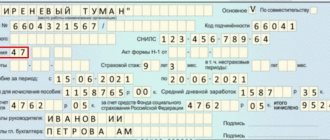The procedure for dismissing employees after receiving disability
Loss of health and inability to continue working are considered grounds for dismissal for reasons beyond the control of the parties (Article 83 of the Labor Code of the Russian Federation).
But this norm applies exclusively to citizens who have received group I disability and are no longer able to work. If health allows a person to work (regardless of the group received), he should be transferred to easier work. To do this, the employee is notified in writing about the availability of other suitable jobs for medical reasons. If there are no suitable vacancies, they are notified in the same way. Having received a job offer, an employee has the right to accept or refuse. If the transfer to another job does not work out, all that remains is to part with it.
Otherwise, the procedure for dismissing an employee with a disability is no different: the employer issues an order to terminate the employment contract, prepares documents related to the employee’s work, and makes a full settlement with the former subordinate. In some cases, you will have to pay severance pay to a disabled person upon dismissal - if the employer infringes on the rights of the employee.
Please note the entry in the work book:
- if total incapacity for work occurs, dismissal is initiated under clause 5 of Art. 83 of the Labor Code of the Russian Federation and the same norm is entered into the work book;
- if an employee with a disability refuses to be transferred to another place, the contract is terminated on the basis of clause 8 of Art. 77 Labor Code of the Russian Federation.
Poor health is not a reason for dismissal
If there are contraindications to work, the medical board will make a recommendation to the employer to suspend the employee from work for the duration of treatment. If outpatient treatment does not produce results, the employee will be sent for examination.
Based on the results of the examination, the medical commission will decide whether the employee is fit for work or not.
A conclusion about the unsuitability of a person’s health to perform certain work can be drawn up only after an examination conducted by a medical commission.
Conditions under which severance pay is due
In order for the right to severance pay to arise, the reason for terminating the employment contract is important. If a person leaves on his own initiative, he is not entitled to any compensation. But if the employer did not find a suitable place for an employee with a disability (it is even more harmful to health) or he refused the transfer voluntarily, the company is obliged to pay severance pay.
IMPORTANT!
Some employers seek to terminate the contract with employees who become disabled by agreement of the parties. In this case, you should carefully read what amounts and in what amount the management of the organization offers. Because the money will be paid under a separate agreement, and not as compensation guaranteed by law.
What is required?
The Labor Code provides, depending on the situation, that the following types of payments are due:
- Wages for actual hours worked.
- Compensation for unused vacation.
- Severance pay.
- Additional bonuses and benefits.
It is worth talking about each type of payment in more detail.
Wage
Due to any employee who worked a certain number of days in a month, but did not receive money for it. Failure to pay wages is an administrative offense or a criminal offense, depending on the circumstances. Therefore, it is better not to violate legal requirements regarding this issue.
Payment is made based on:
- number of days worked but unpaid;
- total earnings due for the month.
The calculation is made by establishing the employee’s average daily income. Only working days are taken into account.
Compensation for unused vacation
An employee who resigns, regardless of the reasons, has the right to receive money for days of earned but unused vacation.
The calculation of what amounts are due for payment is carried out according to the following algorithm:
- The number of vacation days due to the employee is established.
The number of months worked by the employee in a year is taken into account. A month is considered complete if 15 days are worked in it. If an employee has been working in an organization for the first year, then he has the right to receive compensation for full vacation if he has worked for more than 5.5 months. In other cases, you can use the following formula: the total amount of vacation must be divided by 12 and multiplied by the number of months worked. - The average earnings are established for 12 months worked, or for fewer months. The rate (salary, tariff) may be taken into account if there are periods when the employee did not receive wages.
- The number of vacation days due is multiplied by the average daily earnings.
Example: Ivanov S.A. worked at Mediateka LLC for a full year, receiving the right to 28 days of vacation. Average earnings were 953 rubles per day. It turns out that the employer must pay this employee: 953 * 28 = 26,684 rubles.
Severance pay for medical reasons
In accordance with Art. 178 of the Labor Code of the Russian Federation, severance pay is paid upon dismissal for health reasons in the following cases:
- If there was a refusal of the employee himself to take another position.
- If the employer did not have other positions, one of which the employee could be transferred to.
According to Art. 73 of the Labor Code of the Russian Federation, if an employee has a medical report indicating the need to transfer to another job, then the employer is obliged to offer the employee some position that corresponds to the latter’s state of health.
Of course, provided that such a position exists. But an employee of an organization already has the right to choose:
- agree to the transfer;
- refuse the position and be fired.
But, as noted above, in the latter case, the right to receive severance pay arises, the amount of which is equal to two weeks’ average earnings.
How to calculate the amount?
- You need to determine your average daily earnings.
To do this, the amount of income for the reporting period must be divided by the number of working days. For example: a person receives 25,000 rubles per month. This amount must be multiplied by 12 months and divided, for example, by 249. If there were so many working days in a year. Moreover, it is not the calendar year that is taken into account. So, it turns out: 25,000 * 12/249 = 1,204.82 rubles - the amount that a company employee earned per day. - It is necessary to determine the number of days for which compensation is due. The Labor Code of the Russian Federation talks about two-week earnings, but you need to understand that only working days are taken into account. And here, you already need to look at how many days a week a person is at his workplace. If we are talking about a five-day work week, then in two weeks the employee goes to work 10 times.
- Accordingly, we multiply the average daily earnings by the number of days for which benefits are paid: 10 * 1204.82 = 12048.2 rubles.
This amount must be paid by the organization to an employee dismissed for health reasons as severance pay.
Issuance of other funds
An employee who is fired for health reasons has the right to receive bonuses, benefits, and compensation if they are provided for by the organization’s internal agreements, for example, specified in a collective agreement.
Let us add that, in practice, there are often cases when an employee, in court or out of court, demands payments in connection with:
- the occurrence of disability;
- development of an occupational disease.
With disabilities, everything should be more or less clear. If it arose through the fault of the employer, then the latter must compensate for the harm caused, as well as in cases with any injury at work (we wrote about dismissal for health reasons of disabled people in a separate material).
As for occupational diseases: in the vast majority of collective agreements, since such norms can also be found in legislation, there is a rule that the employer guarantees the employee protection from the emergence and development of occupational diseases. diseases.
What kind of diseases are these? For example, quarry workers are characterized by such an irreversible change in the lungs as silicosis. For employees of industries with high noise levels - diseases associated with hearing loss.
If the terms of the collective agreement are violated, you can demand compensation for this.
Amounts of severance pay and rules for calculating it
An employee who leaves for health reasons is required to pay severance pay for 2 weeks, based on average earnings. It will turn out to be slightly less than half the salary that the person received.
But if an employee is fired due to staff reduction or liquidation, he is entitled to payment within 2 months. By decision of the employment service, it is sometimes extended for another third month.
In both cases, the basis for calculations is average earnings, which are determined using formulas from government decree No. 922 dated December 24, 2007. The following is used as initial data:
- all payments for the past 12 months (except for sick leave, financial assistance, travel allowance, and some other amounts);
- number of days worked during the previous year.
The average daily income is equal to: amount of payments/number of days worked.
To calculate a two-week disability benefit, the result is multiplied by 14 days.
Let us show with an example how the amount is calculated. Let’s say citizen Ivanov earned 200,000 rubles in the previous 12 months and worked for 200 days. Severance pay upon dismissal due to disability will be:
200,000 / 200 x 14 = 14,000 (rub.)
To accurately determine your average salary, use our free online calculator.
Employer's liability
According to Art. 236 of the Labor Code of the Russian Federation, the employer must pay 1/150 percent of the key rate of the Central Bank of the Russian Federation for each day of delay for each day of delay. As mentioned, there are criminal and administrative liability. According to the Code of Administrative Offenses of the Russian Federation, you can receive a maximum fine of 50,000 rubles.
The Criminal Code of the Russian Federation is more strict; if payment is not made intentionally for several months, then the head of the company can receive up to 5 years in prison. This is also the maximum sanction.
Thus, a person fired due to deteriorating health may qualify for a number of payments. Some of them are typical for all categories of dismissed workers. But not everyone is paid severance pay.
If you find an error, please select a piece of text and press Ctrl+Enter.
Taxes on payments
If the employee does not have any debts, he is entitled to the entire amount that was obtained in the calculations, since personal income tax is not taken from it. If the employer has a writ of execution and payments are made according to it, another part of the debt will be withheld from the severance pay.
IMPORTANT!
Neither income tax nor insurance contributions are transferred if the amount of severance pay does not exceed three times the average monthly earnings (paragraph 7, paragraph 1 and paragraph 3, Article 217, paragraph 2, paragraph 1, Article 422 of the Tax Code of the Russian Federation, paragraphs 2 clause 1 article 20.2 of Law No. 125-FZ “On compulsory social insurance against accidents at work and occupational diseases”). If the benefit is higher due to an agreement between the parties or a collective agreement, mandatory payments are withheld and transferred to the budget.
Annual leave
In general, the annual basic paid leave is 28 calendar days. Disabled people are granted annual leave of at least 30 calendar days (Article 115 of the Labor Code of the Russian Federation, Article 23 of Law No. 181-FZ). Moreover, such extended leave is due regardless of whether the employee was disabled during the entire working year for which he was granted leave or not.
It should be borne in mind that if, after establishing disability, an employee resigns, then compensation for vacation must be paid to him in proportion to the time when he was recognized as disabled.
Let's say that part of the working year for which leave is granted falls during the period when the employee was not yet disabled. Then for this part he is granted leave at the rate of 28 calendar days per working year. And for the part that falls on the period after the employee was recognized as disabled - at the rate of 30 calendar days per working year.
Taxation issues
All payments that are paid to an employee upon the onset of disability are not subject to taxation in accordance with Article No. 217 of the Tax Code. However, if the benefit amount is greater than the average salary, personal income tax is charged on the excess amount.
As for insurance premiums, they are also not charged on such benefits. Alimony, on the contrary, is collected according to writs of execution from any income of a citizen. Disability benefits are not exempt from this penalty.
Russian legislation protects the rights of people with disabilities and provides them with guaranteed payments, even if they are dismissed from work due to disability. When assigning group 1 disability, the employer can dismiss the employee with the appropriate certificate, however, even in this case, all obligations towards the person with a disability, both personnel and material, must be fulfilled. After this, the employer has the right to hire a new employee to replace the sick person.
Reduced operating time
For disabled people of groups I and II, a reduced working time is established - no more than 35 hours a week while maintaining full wages (Article 92 of the Labor Code of the Russian Federation, Article 23 of Law No. 181-FZ). The duration of daily work (shift) for disabled people must correspond to the issued medical report, for example, IPR (Article 94 of the Labor Code of the Russian Federation).
To indicate shortened working hours in the time sheet in form No. T-12 or T-13 and use: - or the letter code “LC”; – or digital code “21”.
Types of disability
Russian legislation provides for three groups of disabilities, each of which has its own specifics and characteristics. Legal regulation is enshrined in the norms of the law “On Social Protection of Disabled Persons in the Russian Federation”. Disability groups:
- First group. It is assigned if a person is no longer able to move independently, perform any actions, cannot control his behavior, or has completely lost orientation in space.
- Second group. It is prescribed if it is difficult for a person to do something without outside help or special means at hand. It is assumed that a disabled person of the second group is able to live actively only with someone's help.
- The third group is assigned when a disabled person can live an active life only with the use of special means. He can move and do some work himself, but in limited or specially created conditions.
An employer can dismiss disabled people of groups 1 or 2 under this article. For a disabled person of group 3, they can offer easier working conditions if this is provided for in the individual rehabilitation program.
Basic moments
In case of loss of ability to work, a person is assigned disability group 1. The group is appointed by the commission that conducts the medical and social examination (MSEC). Often, dismissal due to group 1 disability is caused by the employee’s inability to perform even simple work. Upon dismissal in this case, the employee is paid a benefit. If the reason for dismissal is medical conditions or incapacity for work, the employee is not required to submit an application to the management of the enterprise. After providing a certificate of the results of the examination, the employer is obliged to dismiss the employee in any case.
HR records management
The basis for filling out the work book of a dismissed employee due to loss of ability to work is the corresponding instructions. The entry in the document must correspond to the contents of the order and the employment agreement. The reason for dismissal is filled in the column “Information on hiring, transfer” with reference to a medical report and an article of the Labor Code of the Russian Federation. The date and order number are indicated in the “Name” column. The record is certified by the seal of the enterprise, as required by the Rules approved by the Government of the Russian Federation.
An example of filling out a work book in case of transfer of an employee to another position
Why should the manager and personnel officer of an enterprise be as prudent and scrupulous as possible regarding labor legislation? Because any step that is not verified with the law can lead to a conflict situation, and the dismissed employee can make legal claims. Particularly difficult is the moment when dismissal occurs due to limitations in work capacity. In this case, the employer must offer the employee another job (light work). If he refuses this position, he must do so in writing.
Each step must be supported by appropriate documentation, otherwise both parties may suffer. For example, if you make an unforgivable mistake in recording a work record (incorrectly indicate a link to an article of the Labor Code of the Russian Federation, which will lead to data inconsistency), and the person may face a lot of problems in the future. On the other hand, such a mistake can turn into a huge problem for the company if, after litigation, it has to pay a fine for violating labor laws.
It is worth noting that there is often confusion in the concepts of health status and professional incompetence. Professional unsuitability is a discrepancy between the professional qualities of an employee and the position held. Therefore, in the case of dismissal for health reasons, this formulation is unacceptable.
Rights and guarantees for people with disabilities
Additional preferences are provided for working disabled people:
- Shortened working week for persons with disabilities of the first and second groups.
- Increased paid leave of 30 days.
- The right to take vacation at your own expense for up to two months a year.
- Disabled people are involved in extracurricular, night work, and on holidays only on the basis of a written agreement.
- Persons with disabilities are protected from termination of employment contracts due to staff reductions.
Almost throughout the entire territory of the Russian Federation there is a quota for persons with disabilities. The quota is determined as a percentage based on the number of employees. The average headcount does not include subordinates who work in harmful and dangerous conditions. The employer’s responsibilities include arranging a workplace for a citizen with disabilities in accordance with established requirements.
ATTENTION! If an employer refuses to employ a disabled person within the established quota, a fine is imposed.
The obligation of legal entities to create and allocate jobs for people with disabilities is enshrined in the Federal Law and regional regulations, according to which employers are obliged to create and allocate jobs for people with disabilities in accordance with the established quota.
Other grounds for dismissal
If you close your eyes to the medical component, in other respects, from the point of view of the law, a disabled person is the same employee as everyone else. He can be fired for the same reasons as another employee, but there are some nuances related to the social protection of disabled people. Let's consider them in the context of dismissal clauses.
- At your own request . A disabled person can terminate cooperation of his own free will by writing a corresponding statement. The law allows him, as a benefit, not to work the required 14 days.
- Inadequacy for your position . If a disabled person fails to pass recertification with the required results, he has the right to be dismissed, like another insufficiently qualified employee. The employer may provide him with another position for which he meets the requirements, if such a vacancy exists and the employee agrees to it.
- Reduction in staff or numbers . Here there are several more opportunities for a disabled person to stay, because the law regulates their priority for such grounds for dismissal. With equal performance indicators, the employer is obliged to retain an employee with a disability or a guardian of a disabled relative, especially if the disability was the result of working for this employer. It is important to remember that the determining factor will not be the disability, but the employee’s skill level.
- Failure to comply with labor regulations . Like any employee, a disabled person must obey the Labor Code requirements regarding labor discipline. He can be fired for proven absenteeism, repeated tardiness, or other disciplinary violations in the usual manner.
- Agreement of the parties . A disabled person can negotiate with the employer about dismissal on mutually acceptable terms.
- Liquidation of an enterprise or change of owner . There’s nothing you can do about it; absolutely all employees, even preferential categories, fall under this basis.
ATTENTION! Registration of dismissal of a disabled person is carried out in accordance with the usual regulations of this procedure, depending on the article. The situation is similar with dismissal payments.






